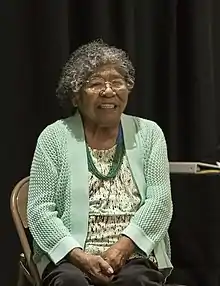Wukchumni dialect
Wukchumni (Wikchamni) is a dialect of Tule-Kaweah Yokuts that was historically spoken by the Wukchumni people of the east fork of the Kaweah River of California.

| Wukchumni | |
|---|---|
| Wikchamni | |
| Region | California |
| Ethnicity | Wukchumni |
Native speakers | 1 [1] |
Yok-Utian
| |
| Language codes | |
| ISO 639-3 | – |
| Glottolog | wikc1234 |
Marie Wilcox, born 1933, is currently the only remaining native speaker of the language.[2][3]
Phonology
The following tables are based on Gamble (1978).[4]
Consonants
| Bilabial | Dental/ Alveolar |
Post- alveolar |
Velar | Glottal | ||
|---|---|---|---|---|---|---|
| Plosive | voiceless | p | t | ʈ | k | ʔ |
| aspirated | pʰ | tʰ | ʈʰ | kʰ | ||
| ejective | pʼ | tʼ | ʈʼ | kʼ | ||
| Affricate | voiceless | t͡ʃ | ||||
| aspirated | t͡ʃʰ | |||||
| ejective | t͡ʃʼ | |||||
| Fricative | s | ʃ | x | h | ||
| Nasal | plain | m | n | ŋ | ||
| glottalized | mˀ | nˀ | ŋˀ | |||
| Approximant | plain | w | l | j | ||
| glottalized | wˀ | lˀ | jˀ | |||
Allophones of /ʃ, x/ include [ʒ̊, xʷ].
Status
Wukchumni is categorized as 8a or "moribund" on the Expanded Graded Intergenerational Disruption Scale.[5][6]
Revitalization efforts
In the early 2000s, Marie Wilcox, aided by her daughter Jennifer Malone, began compiling a Wukchumni dictionary.
Wilcox and Malone currently hold classes teaching beginner and intermediate Wukchumni to interested tribal members.[7][8]
Efforts to revive Wukchumni have additionally been organized through the Master-Apprentice Language Learning Program.[6]
References
- https://www.youtube.com/watch?v=jl1O1Fmb2uE
- Society, National Geographic (2017-06-23). "Recording a Dying Language". National Geographic Society. Retrieved 2019-08-29.
- Gilpin, Caroline Crosson (2018-03-22). "Teaching With: 'Who Speaks Wukchumni?'". The New York Times. ISSN 0362-4331. Retrieved 2019-08-29.
- Gamble, Geoffrey (1978). Wikchamni Grammar. Berkeley: Berkeley and Los Angeles: University of California Press.: University of California Publications in Linguistics, 89.
- "Language Status". Ethnologue. Retrieved 2019-09-01.
- Riley, Elise A. (2016). "Language Revitalization Practices in Indigenous Communities of the U.S." Cite journal requires
|journal=(help) - "Tulare County Nüümü Yadoha Program". Owens Valley Career Development Center.
- "Keeping Native American languages alive: In "Marie's Dictionary," Wukchumni lives on". Salon. 2018-04-20. Retrieved 2019-08-29.
- "Language Keepers". Emergence Magazine. Retrieved 2019-08-29.
- Wukchumni: Four Generations, retrieved 2019-08-30